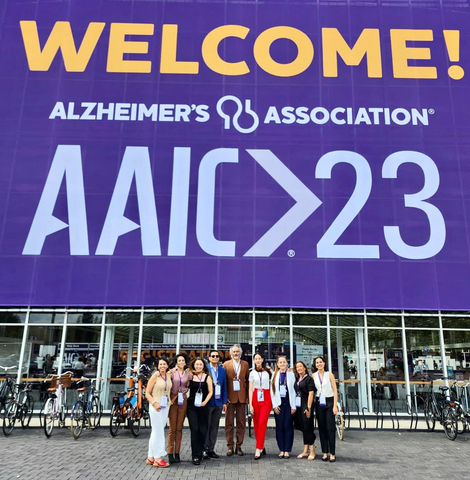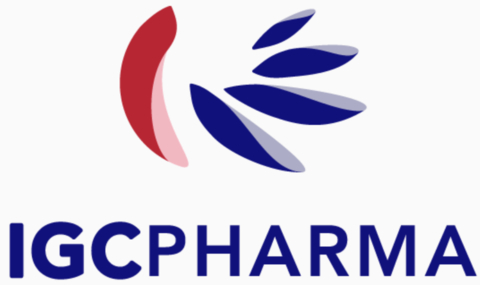IGC Pharma, Inc. Presenting 6 Posters on the Positive Impact of IGC-AD1 on Neuropsychiatric Symptoms in Dementia at the 2023 Alzheimer’s Association International Conference
IGC Pharma, Inc. Presenting 6 Posters on the Positive Impact of IGC-AD1 on Neuropsychiatric Symptoms in Dementia at the 2023 Alzheimer’s Association International Conference
POTOMAC, Md.--(BUSINESS WIRE)--IGC Pharma, Inc. (NYSE American: IGC) (“IGC” or the “Company”), a clinical-stage pharmaceutical company, today announced that it is presenting 6 in-person posters highlighting data from its Phase 1 clinical trials investigating the Company’s lead therapeutic candidate, IGC-AD1, at the Alzheimer’s Association International Conference (“AAIC”) being held July 16-20, 2023, in Amsterdam, Netherlands.
IGC-AD1 is the only natural low-doses THC-based investigational drug undergoing FDA trials. The therapy relies on low doses of THC and another compound as active agents for the treatment of neuropsychiatric symptoms associated with Alzheimer’s disease. It has also shown in pre-clinical trials the potential to be effective in ameliorating Aβ plaque, a key hallmark of Alzheimer’s. IGC-AD1 is currently in Phase 2 of clinical trials as a potential treatment for agitation in dementia due to Alzheimer’s. According to Alzheimer’s Disease International, the number of people living with Alzheimer’s and other dementias is projected to nearly triple by 2050, with approximately 76% experiencing neuropsychiatric symptoms like agitation. IGC expects that 13-15 trial sites can process between 15 to 20 patients per month and is targeting completion of its Phase-2 trial in the first quarter of calendar year 2024.
Ram Mukunda, CEO of IGC stated, “We are honored to have six posters accepted for presentation at AAIC 2023, a prestigious meeting of leading Alzheimer’s disease experts and pharmaceutical innovators. The data being presented at AAIC from our Phase 1 clinical trial of IGC-AD1 demonstrates the positive impact of our patented cannabinoid formulation on neuropsychiatric symptoms such as agitation, apathy, and the associated caregiver distress, without causing suicidal ideation or increasing blood pressure variability. Additionally, we are pleased to announce the presentation of our genotyping study analyzing the pharmacokinetics of THC metabolization in diverse patient groups. IGC is committed to increasing diversity in clinical trials and subsequently developing effective treatments for all who are impacted by Alzheimer’s disease. We are encouraged by the results of IGC-AD1 so far and we continue to drive progress in our Phase 2 trial.”
To view the posters including data sets and conclusions visit https://aaic.alz.org/
Poster Number: P2-694
Poster Title: Effect of the Combination of Tetrahydrocannabinol and Melatonin (IGC-AD1) on Blood Pressure Variability in Patients with Mild to Moderate Alzheimer’s Disease
Presenting Author: Maria Paula Naranjo, David Silva-García, Evelyn Gutiérrez, Laura Tatiana Sánchez, Maria Juanita Arbelaez, Maria Alejandra Tangarife, Laura Delgado-Murillo, Diego Rodriguez-Soacha, Saadia Shahnawaz, Varduhi Ghazaryan, Maria Paula Naranjo, Margarita Venegas, Karen Y. Pujals, William Julio, Claudia Grimaldi, Krista Lanctôt, L. Elliot Hong, and Ram Mukunda
Session Title & Date: P2-01 Drug Development: Human Monday July 17, 2023: 8:45 AM- 4.15 PM
Poster Highlights: Preliminary data from the Phase I multiple ascending dose study suggests that investigational drug IGC-AD1 does not have a significant impact on BP or BPV in AD patients with controlled and uncontrolled BP. Regression analysis indicates that multiple ascending doses between cohorts may have lowered average BP during the trial.
Poster Number: P3-648
Poster Title: Cytochrome P450 2C9 Polymorphism in Puerto Rican Alzheimer’s Disease Patients and its Role in the Pharmacokinetics of IGC-AD1, an Investigational Drug
Presenting Author: Jagadeesh S Rao, Evelyn Gutierrez, Claudia Grimaldi, William Julio, Saadia S Shahnawaz, and Ram Mukunda
Session Title & Date: P3-01 Drug Development: Human Tuesday, July 18, 2023: 8:45 AM- 4.15 PM
Poster Highlights: Puerto Rican AD patients had 62% CYP2C9 polymorphism; 54% were intermediate metabolizers and 38% were normal metabolizers. Intermediate metabolizers had altered THC metabolism leading to longer THC half-lives compared with normal metabolizers. Polymorphisms in CYP2C9 can lead to accumulation of THC and its active metabolite as well as prolonging its elimination.
Poster Number: P3-663
Poster Title: Reduction of Neuropsychiatric Symptoms and Associated Caregiver Distress Using a Combination of Tetrahydrocannabinol and Melatonin in Dementia due to Alzheimer's Disease.
Presenting Author: Alejandra Tangarife, Evelyn Gutiérrez, Laura Tatiana Sanchez, Maria Juanita Arbelaez, Laura Delgado-Murillo, Diego Rodriguez-Soacha, Saadia Shahnawaz, Varduhi Ghazaryan, Maria Paula Naranjo, Margarita Venegas, David Silva-García, Karen Y. Pujals, William Julio, Claudia Grimaldi, Krista Lanctôt, L. Elliot Hong, Ram Mukunda
Session Title & Date: P3-01 Drug Development: Human Tuesday, July 18, 2023: 8:45 AM – 4:15 PM
Poster Highlights: At all three dosages, IGC-AD1 led to a clinically and statistically significant reduction in NPS and caregiver distress as measured by the NPI-12. The active and placebo score comparison in this study suggests that IGC-AD1 may be efficacious at reducing NPS in AD patients.
Poster Number: P3-657
Poster Title: Effect of Tetrahydrocannabinol and Melatonin Combination on Suicide Ideation and Behavior in Dementia due to Alzheimer’s Disease
Presenting Author: Laura Delgado-Murillo, Evelyn Gutiérrez, Laura Tatiana Sanchez, Maria Juanita Arbelaez, Maria Alejandra Tangarife, Diego Rodriguez-Soacha, Saadia Shahnawaz, Varduhi Ghazaryan, Maria Paula Naranjo, Margarita Venegas, David Silva-García, Karen Y. Pujals, William Julio, Claudia Grimaldi, Krista Lanctôt, L. Elliot Hong, and Ram Mukunda
Session Title & Date: P3-01 Drug Development: Human Tuesday, July 18, 2023: 8:45 AM – 4:15 PM
Poster Highlights: Clinically significant decreases in NPI-12 (depression domain) were observed in all three study cohorts. IGC-AD1 did not create a risk of developing suicidal ideation or behavior as assessed by the C-SSRS in the mild to moderate AD population during the 6-week Phase I trial. IGC-AD1 appears to be a promising pharmaceutical option for the treatment of depression.
Poster Number: P3-660
Poster Title: Reduction of Agitation and Caregiver Distress Using a Combination of Tetrahydrocannabinol and Melatonin in Dementia due to Alzheimer's Disease.
Presenting Author: Maria Juanita Arbelaez, Evelyn Gutiérrez, Laura Tatiana Sanchez, Maria Alejandra Tangarife, Laura Delgado-Murillo, Diego Rodriguez-Soacha, Saadia Shahnawaz, Varduhi Ghazaryan, Maria Paula Naranjo, Margarita Venegas, David Silva-García, Karen Y. Pujals, William Julio, Claudia Grimaldi, Krista Lanctôt, L. Elliot Hong, and Ram Mukunda
Session Title & Date: P3-01 Drug Development: Human Tuesday, July 18, 2023: 8:45 AM – 4:15 PM
Poster Highlights: In the Phase 1 trial IGC-AD1 was found to be safe, well-tolerated, and caused no serious Adverse Events. In the Active Group, the mean NPI Agitation and NPI-D scores decreased by 36% and 55%, respectively. These NPI Agitation and NPI-D scores indicate that IGC-AD1 may be efficacious at reducing agitation due to AD and associated caregiver distress.
Poster Number: P3-662
Poster Title: Reduction of Apathy and Caregiver Distress Using a Combination of Tetrahydrocannabinol and Melatonin in Dementia due to Alzheimer's Disease.
Presenting Author: Evelyn Gutiérrez, Laura Tatiana Sanchez, Maria Juanita Arbelaez, Maria Alejandra Tangarife, Laura Delgado-Murillo, Diego Rodriguez-Soacha, Saadia Shahnawaz, Varduhi Ghazaryan, Maria Paula Naranjo, Margarita Venegas, David Silva-García, Karen Y. Pujals, William Julio, Claudia Grimaldi, Ram Mukunda, L. Elliot Hong, Krista Lanctôt
Session Title & Date: P3-01 Drug Development: Human Tuesday, July 18, 2023: 8:45 AM – 4:15 PM
Poster Highlights: In Cohort 1, Cohort 2, and Cohort 3, apathy as measured by NPI-Apathy decreased by 44.44%, 53.84%, and 49.88%, respectively. These results were clinically significant.
About IGC Pharma, Inc.
IGC Pharma, Inc., (IGC) develops advanced cannabinoid-based formulations for treating diseases and conditions, including, but not limited to, Alzheimer’s disease, period cramps (“dysmenorrhea”), premenstrual syndrome (“PMS”), and chronic pain. IGC has two investigational drug assets targeting Alzheimer’s disease, IGC-AD1 and TGR-63, which have demonstrated in Alzheimer’s cell lines the potential to be effective in suppressing or ameliorating key hallmarks of Alzheimer’s disease, such as plaques or tangles. IGC-AD1 is a low-dose tetrahydrocannabinol (“THC”) based formulation that is currently in an 146-person Phase 2 clinical trial for agitation in dementia due to Alzheimer’s (clinicaltrials.gov, NCT05543681). IGC Pharma, Inc., also markets a wellness brand, Holief™, that targets women experiencing premenstrual syndrome and menstrual cramps.
Forward-looking Statements
This press release contains forward-looking statements. These forward-looking statements are based largely on IGC’s expectations and are subject to several risks and uncertainties, certain of which are beyond IGC’s control. Actual results could differ materially from these forward-looking statements as a result of, among other factors, the Company’s failure or inability to commercialize one or more of the Company’s products or technologies, including the products or formulations described in this release, or failure to obtain regulatory approval for the products or formulations, where required; general economic conditions that are less favorable than expected, including as a result of the ongoing COVID-19 pandemic; the FDA’s general position regarding cannabis- and hemp-based products; and other factors, many of which are discussed in IGC’s U.S. Securities and Exchange Commission (“SEC”) filings. IGC incorporates by reference the human trial disclosures and Risk Factors identified in its Annual Report on Form 10-K filed with the SEC on July 7, 2023, as if fully incorporated and restated herein. In light of these risks and uncertainties, there can be no assurance that the forward-looking information contained in this release will occur.
Contacts
Investors
Walter Frank
igc@imsinvestorrelations.com
(203) 972-9200
Media
Rosalyn Christian
rchristian@imsinvestorrelations.com
(203) 972-9200

